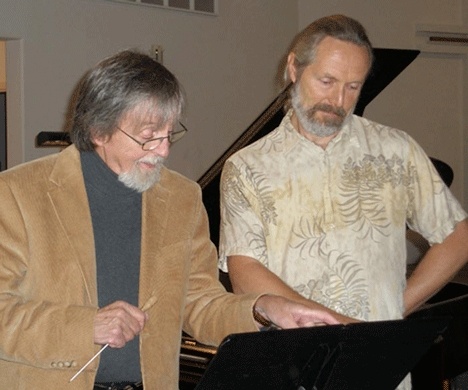Dit-dit-dit-daaaah. Dit-dit-dit-daaaah.
Music buffs might recognize the repeated three quick Gs and one long E-flat as the most memorable music phrase of all time.
That’s the beginning of Beethoven’s Fifth Symphony, which is included in the opening program, “The Mighty Fifth,” of the Saratoga Chamber Orchestra’s third season.
Musical conductor Legh Burns is pleased to be performing the ever-popular piece — formally entitled “Symphony No. 5 in C minor, Op. 67” — along with “Festival Overture, Op. 96” by Dmitri Shostakovich.
Also on the program will be Greenbank resident Karl Olsen as guest soloist in two operatic arias for the baritone voice, “Vision Fugitive” from Massenet’s opera “Hérodiade,” and
“Di Provenza” from “La Traviata” by Giuseppe Verdi.
The first concert of the season will be 7 p.m. Monday, Oct. 12 at the Coupeville Performing Arts Center. The second will be 7 p.m. Tuesday, Oct. 13 in the auditorium at South Whidbey High School in Langley.
Interestingly, Beethhoven’s famous piece, written between 1804 and 1808, was used by the British Broadcasting Company during World
War II to introduce its radio news broadcasts because the four-note motif corresponds to the letter “V” for “victory” in Morse code. It was one of the most patriotic gestures one could make.
“This seemingly simplistic four-note opening was a long time in coming,” Burns noted. “Beethoven ‘experimented’ with it many times, especially in works for piano, before applying it to the Fifth Symphony.”
But beyond the rampant popularity the first line of the symphony has garnered over the course of centuries, including its appearances in pop culture, rock ’n’ roll, film and television, it was Beethoven’s genius in creating a whole new form in music with this symphony that impresses Burns.
“Beethoven has always fascinated me, mostly because of the way he set new parameters for large forms of music,” Burns said.
“Most everything heretofore could be described in terms of refinement. The music of Haydn and Mozart, while extraordinary, pretty much followed the same formula. Beethoven, by contrast, blew apart these forms and established his own.”
“Symphonies were expanded, the minuet became the scherzo, lyric melodies became short, dramatic motives, concertos took on almost a completely different shape,” he explained.
The Fifth Symphony, Burns said, demonstrates these expansions in many ways, with Beethoven’s introduction of the piccolo, trombone and contrabassoon in a symphony for the first time.
“The third movement is unlike any written beforehand, neither an elegant minuet, nor a more frenetic scherzo. And, for good measure, he brings it back in the final movement, almost as though it has been there all along. Instead of a broad lyric first theme, the piece begins with a dramatic statement that is heard in every movement, albeit sometimes disguised,” he said.
A continued excitement for Burns is the variety of talent on the island that seems to always fall into his lap.
In addition to his duties as minister of music at Trinity Lutheran Church in Freeland and having taught elementary music in all three school districts on the island, Olsen is also the newest member of the well-known folk music singing group, The Brother’s Four, which tours nationally and internationally.
“We are so fortunate to engage such a diverse talent to sing with the orchestra for our opening concerts,” Burns said.
“Karl is another great example of the vast number of talented musicians that live here on Whidbey.”
For his part, Olsen said he feels lucky to be able to sing in so many different styles.
“I was laughing with Legh the other day because I had just finished singing ‘Row, Row, Row Your Boat’ with my preschool kids, and then
I walked down the hall to meet with Legh and sing some opera,” Olsen said.
Singing opera is not new to Olsen. Voice was his major instrument when he graduated college with a music education degree. But he hasn’t spent much time singing opera in the past 25 years.
“I am fortunate to have been exposed to and immersed in a wide variety of musical styles over the years, from my father’s love of classical music and popular song, to my years singing and playing jazz and some rock and roll, to the recent years of world music and to the wonderful community aspect of folk music,” he said.
“I try and approach everything I sing with a healthy vocal concept — lots of support, air and freedom.”
Singing an aria will require a different style than singing folk music, but Olsen said he can sing whatever moves him and does it the best way he knows how with the foundation he’s already built.
“This week I get to be Herod singing of his passion for Salomé, and an Italian father consoling his son after losing his true love. It’s a challenge, but it should be fun,” he added.
Ultimately, Burns said, although he knows that audiences will be familiar with some of the music, particularly Beethoven’s Fifth, it is his job to make audience and orchestra alike feel as though this is the first time they’ve really heard the piece.
“There are so many dramatic elements in that symphony, from sudden dynamic changes, to the way the fourth movement … suddenly explodes (from C minor) into the key of C major, another innovation,” Burns said.
“I can’t wait.”
General admission tickets are $20, $18 and $15 and are available for the Coupeville concert at Bayleaf in Coupeville and Oak Harbor, and ClickMusic.biz in Oak Harbor. Tickets for the Langley concert can be purchased at Moonraker Books. Credit-card sales for both concerts are accepted online at www.brownpapertickets.com. Cash and checks will be accepted at the door. For more info, visit the SCO Web site, click here.


